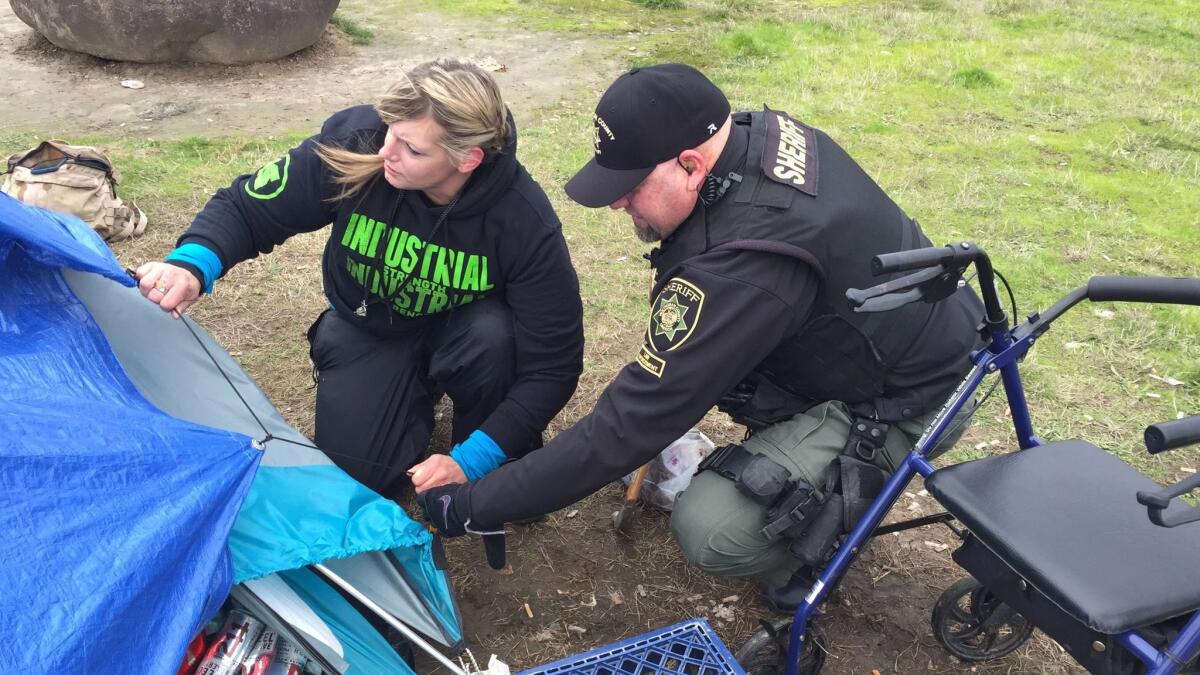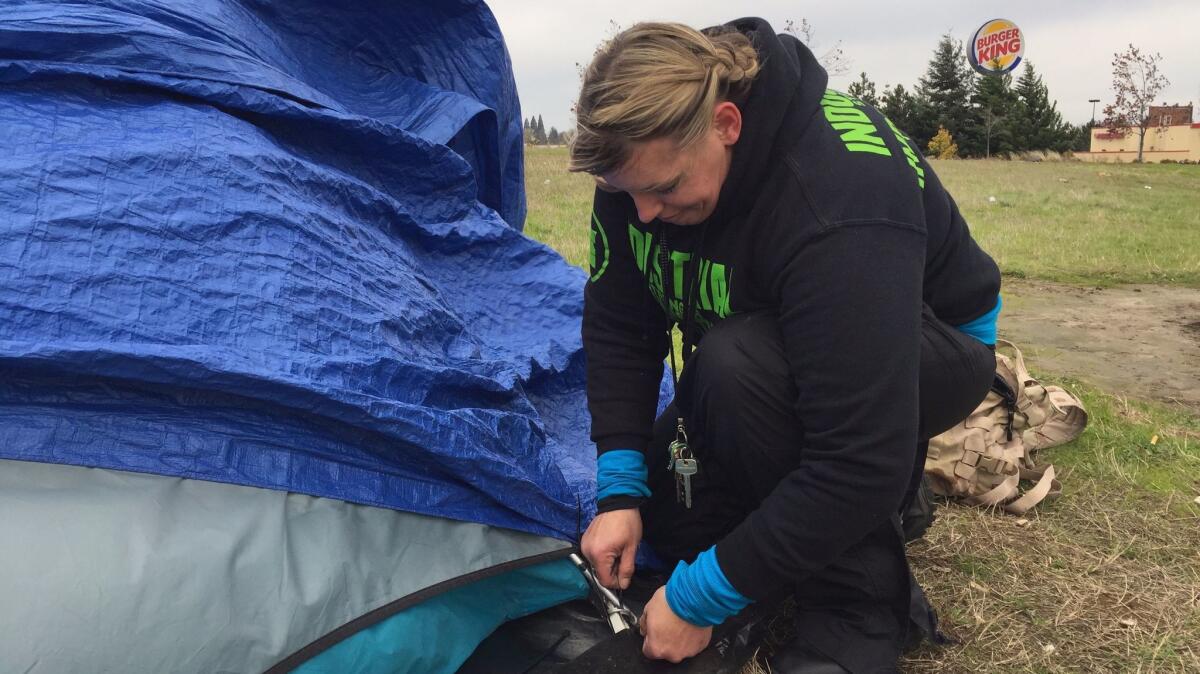She used to get high on heroin and lived in a tent. Now she’s helping homeless people get off the streets

Reporting from PORTLAND, ORE. — The soft voice from inside the tent could barely be heard over the howling wind, freeway noise and wild flapping of the tarp. So Tiffany Grigg, perched on a milk crate in the mud, leaned in to listen.
It was a 45-degree November morning, and the gray-and-turquoise tent sat in the middle of a forlorn field next to Interstate 84 east of Portland. Empty cans of Steel Reserve malt beverage and a nearby four-wheeled walker hinted at hard times.
Grigg ignored the pelting rain and listened to the homeless man inside the tent for what seemed an eternity before finally bouncing back to the relative shelter of her Toyota 4Runner. There had been no breakthrough, no epiphany, but she had made a connection, and that was the point.
“When was the last time a person sat with him that didn’t want his [debit] card, or booze?” asked Grigg, an outreach coordinator with the Clackamas Service Center. “It took that long for him to start talking about himself, for real.”
It is the essence of her job: listening, building relationships. This time of year, donations and volunteer efforts peak for charities nationwide, but along with 2 million other American social service workers, this is Grigg’s day to day.
Social services and law enforcement partners in Portland say the 33-year-old Grigg has leveraged her experience as a former homeless addict to become a linchpin provider for some of the largest homeless camps in Oregon. She works until the wee hours, often with a lit Marlboro 100 dangling from her lips, and knows people like the man in the tent — whom confidentiality laws prevent from being identified — on a first-name basis.
Grigg has been in her current position since summer 2016, when the number of unsheltered homeless individuals living near her service center — and a resulting sweep by authorities to displace and relocate homeless people — became the talk of the town.
Part of what makes Grigg’s job matter isn’t just how, or why, she does it. It’s where.
Grigg’s center is near the border between Clackamas and Multnomah counties, two of the three populous Oregon counties that form the metro Portland area. Data from 2017 point-in-time counts of homeless people suggest that neighborhoods there form the largest concentration of unsheltered homeless individuals in the region.
This is a crucial time for the service center. The facility has been a one-stop shop for decades and a winter shelter for at least 10 years, but it is rebuilding after a devastating July 3 fire. Executive director Debra Mason said the center is still offering key services — including hot meals six nights a week — but won’t reopen until at least spring.
In the interim, Grigg works out of an apartment that serves as the center’s office, along with modular containers and trailers nearby. “Never let anyone dull your sparkle,” says a small sign over her desk.
Her 4Runner has become a mobile disaster-relief center of sorts, its interior stuffed with dozens of blankets, water, food, clothing, batteries, Gorilla tape, thermal heat wraps, hand sanitizer and hundreds of new white socks.
There’s also a baseball and two gloves. Grigg sometimes will ask her clients to join in a quick game of catch. They often agree.
Mason marvels at how Grigg uses the baseball to make connections. “It gives me chills to think about it,” Mason said. “Doesn’t that just bring you back to your childhood?”

Grigg lived a year of her life in a tent within walking distance of her office. She was a heroin addict who said she walked away from her condo and hit rock bottom after an arrest for stealing crackers from a Wal-Mart. “Cracker Girl,” the other inmates called her.
Grigg, who has been clean eight years, has a much different relationship with law enforcement nowadays. Sgt. Randy Teig of the Portland Police Bureau, whose Neighborhood Early Response Team responds to calls in the homeless camps, said his officers “all have her on speed dial — we call her first.”
She also coaches burly men in body armor during early-morning meetings at coffee shops. One recent morning, she met with Deputy DeWayne McQueen, part of Multnomah County’s Homeless Outreach and Programs Engagement, or HOPE, team.
“She’s taught us so much, in terms of what resources are available, but also what the mindset is to be really good at this,” McQueen said.
On this day, she reminded McQueen that, when talking to people who often feel powerless, phrasing sentences a special way lets them feel they are the decision-makers.
“Your wording is everything,” she corrected McQueen, offering as an example, “What can we do to help you get to where you want to go?”
“It’s going to take some sitting down by the fire in the dirt with him,” Grigg told two other deputies about a client they planned to visit. “What if you could take a ball to throw with him? He’s intimidated by you guys.”
Grigg also partners with local faith communities, retrieving blankets from a modular container in a church parking lot. Because of her faith, she says, she doesn’t hesitate to take solo trips well after dark. Is she ever afraid?
“I’m never by myself. I’ve got God,” she said.
Plus, she explained, night is a preferred time for her target population.
“People are more comfortable moving in the dark,” Grigg said. Homeless people “get stared at during the day.”
During a late-night November outreach effort to the camps, Grigg went over fences and down steep, muddy inclines under bridges. She alternately joked with or scolded people who came up to her for blankets, boots and batteries.
One man literally danced a jig after shucking Adidas sandals to don the socks and leather boots Grigg handed him in the cold drizzle.
“Heroin addict!” the man yelled at her, with a rough laugh.
“I prefer the term ‘Junkie — Retired,’ ” Grigg shot back lightly.
The man had no tent to stave off the cold and ubiquitous damp, and he clung tightly to the two blankets Grigg gave him.
“You eat, and stop moving, you’ll be good,” Grigg told him.
A homeless woman got a blanket too. She paused on her way back to sleep in a car.
“She’s gotten me out of a lot of situations,” the woman said. “She’s my lifeline. She makes me feel safe. She comes at the right angles.”
Nearby, Grigg worked on a man’s tent, which had been ripped open by an intruder and was taking on water.
“Watch MacGyver work,” Grigg joked, maneuvering a zip tie.
Then Grigg, who moved remarkably fast even in three pairs of pants to fend off the cold and wet, headed under more bridges — muddy, damp, graffiti-filled places along Johnson Creek.
She woke a man who yelled out before recognizing her. She laid a blanket on him.

City of Portland and Multnomah County officials are busily preparing for what could be another severe winter. During an unusual cold snap in January, four people died from exposure on local streets.
Marc Jolin, director of the city-county Joint Office of Homeless Services, which funds Grigg’s job, cites her work as evidence that not all in the helping professions need letters after their name.
“I think we know that there’s an important role for trained social workers, but we also recognize the importance of people who have shared, lived experience, who can be helping people as peers,” he said.
Grigg sometimes deduces things those with advanced degrees might miss. For example, why did the man pitch his gray-and-turquoise tent in the middle of a windy field? Because, Grigg explained, when you’re on the streets, some threats outweigh the weather.
“He’s out in the open. He’s safe,” Grigg said. “Nobody’s going to victimize him.”
Grigg then dug through plastic bins in her truck to produce an unexpected item: a pair of foam earplugs. She grinned ear to ear as she held them up.
“The flapping of the tarps could bother him,” she said.
Since Grigg started at the service center, Mason estimates, she has helped 280 people get off the streets.
But Grigg declines to take credit.
“I have not gotten anybody indoors,” she said. “They have gotten themselves indoors.”
Schmid is a special correspondent.
ALSO
President Trump seems keen on picking fights with athletes. Or is it with black athletes?
Despite an accident, hundreds still willing to gamble on riding driverless shuttle in Las Vegas
Roy Moore’s Senate campaign is a train wreck. So why does he still have a decent shot at winning?
More to Read
Sign up for Essential California
The most important California stories and recommendations in your inbox every morning.
You may occasionally receive promotional content from the Los Angeles Times.










